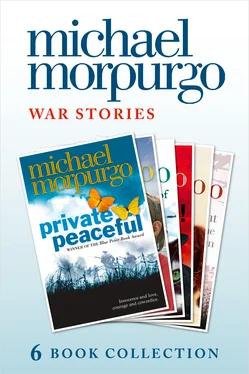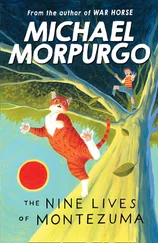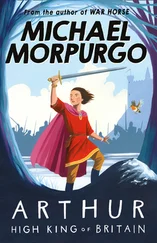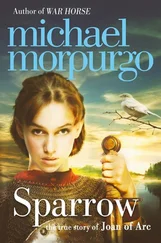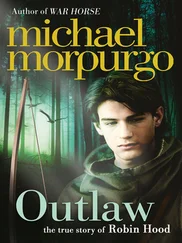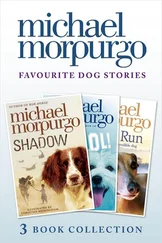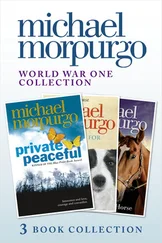At home we don’t wear boots, except for church. Mother does of course, and Father always wore his great hobnail boots, the boots he died in. When the tree came down I was there in the wood with him, just the two of us. Before I ever went to school he’d often take me off to work with him, to keep me out of mischief, he said. I’d ride up behind him on Billyboy and hang on round his waist, my face pressed into his back. Whenever Billyboy broke into a gallop I’d love it. We galloped all the way that morning, up the hill, up through Ford’s Cleave Wood. I was still giggling when he lifted me down.
“Off you go, you scallywag, you,” he said. “Enjoy yourself.”
I hardly needed to be told. There were badger holes and fox holes to peer into, deer prints to follow perhaps, flowers to pick, or butterflies to chase. But that morning I found a mouse, a dead mouse. I buried it under a pile of leaves. I was making a wooden cross for it. Father was chopping away rhythmically nearby, grunting and groaning at every stroke as he always did. It sounded at first as if Father was just groaning a bit louder. That’s what I thought it was. But then, strangely, the sound seemed to be coming not from where he was, but from somewhere high up in the branches.
I looked up to see the great tree above me swaying when all the other trees were standing still. It was creaking while all the other trees were silent. Only slowly did I realise it was coming down, and that when it fell it would fall right on top of me, that I was going to die and there was nothing I could do about it. I stood and stared, mesmerised at the gradual fall of it, my legs frozen under me, quite incapable of movement.
I hear Father shouting: “Tommo! Tommo! Run, Tommo!” But I can’t. I see Father running towards me through the trees, his shirt flailing. I feel him catch me up and toss me aside in one movement, like a wheat sheaf. There is a roaring thunder in my ears and then no more.
When I wake I see Father at once, see the soles of his boots with their worn nails. I crawl over to where he is lying, pinned to the ground under the leafy crown of the great tree. He is on his back, his face turned away from me as if he doesn’t want me to see. One arm is outstretched towards me, his glove fallen off, his finger pointing at me. There is blood coming from his nose, dropping on the leaves. His eyes are open, but I know at once they are not seeing me. He is not breathing. When I shout at him, when I shake him, he does not wake up. I pick up his glove.
In the church we’re sitting side by side in the front row, Mother, Big Joe, Charlie and me. We’ve never in our lives sat in the front row before. It’s where the Colonel and his family always sit. The coffin rests on trestles, my father inside in his Sunday suit. A swallow swoops over our heads all through the prayers, all through the hymns, flitting from window to window, from the belfry to the altar, looking for some way out. And I know for certain it is Father trying to escape. I know it because he told us more than once that in his next life he’d like to be a bird, so he could fly free wherever he wanted.
Big Joe keeps pointing up at the swallow. Then without any warning he gets up and walks to the back of the church where he opens the door. When he gets back he explains to Mother what he’s done in his loud voice, and Grandma Wolf, sitting beside us in her black bonnet, scowls at him, at all of us. I know then what I never understood before, that she is ashamed to be one of us. I didn’t really understand why until later, until I was older.
The swallow sits perched on a rafter high above the coffin. It lifts off and swoops up and down the aisle until at last it finds the open door and is gone. And I know that Father is happy now in his next life. Big Joe laughs out loud and Mother takes his hand in hers. Charlie catches my eye. At that moment all four of us are thinking the very same thing.
The Colonel gets up into the pulpit to speak, his hand clutching the lapel of his jacket. He declares that James Peaceful was a good man, one of the best workers he has ever known, the salt of the earth, always cheerful as he went about his work, that the Peaceful family had been employed in one capacity or another, by his family, for five generations. In all his thirty years as a forester on the estate James Peaceful had never once been late for work and was a credit to his family and his village. All the while as the Colonel drones on I’m thinking of the rude things Father used to say about him — “silly old fart”, “mad old duffer” and much worse — and how Mother had always told us that he might well be a “silly old fart” or “mad old duffer”, but how it was the Colonel who paid Father’s wages and owned the roof over our heads, how we children should show respect when we met him, smile and touch our forelocks, and we should look as if we meant it too, if we knew what was good for us.
Afterwards we all gather round the grave and Father’s lowered down, and the vicar won’t stop talking. I want Father to hear the birds for the last time before the earth closes in on top of him and he has nothing left but silence. Father loves larks, loves watching them rising, rising so high you can only see their song. I look up hoping for a lark, and there is a blackbird singing from the yew tree. A blackbird will have to do … I hear Mother whispering to Big Joe that Father is not really in his coffin any more, but in heaven up there — she’s pointing up into the sky beyond the church tower — and that he’s happy, happy as the birds.
The earth thuds and thumps down on the coffin behind us as we drift away, leaving him. We walk home together along the deep lanes. Big Joe plucking at the foxgloves and the honeysuckle, filling Mother’s hands with flowers, and none of us has any tears to cry or words to say. Me least of all. For I have inside me a secret so horrible, a secret I can never tell anyone, not even Charlie. Father needn’t have died that morning in Ford’s Cleave Wood. He was trying to save me. If only I had tried to save myself, if I had run, he would not now be lying dead in his coffin. As Mother smooths my hair and Big Joe offers her yet another foxglove, all I can think is that I have caused this.
I have killed my own father.
CONTENTS Dedication For my dear godmother, Mary Niven Five Past Ten Twenty to Eleven Nearly Quarter Past Eleven Ten to Midnight Twenty-Four Minutes Past Twelve Nearly Five to One Twenty-Eight Minutes Past One Fourteen Minutes Past Two A Minute Past Three Twenty-Five Past Three Nearly Four O’Clock Five to Five One Minute to Six Postscript Author’s Note
I don’t want to eat. Stew, potatoes and biscuits. I usually like stew, but I’ve no appetite for it. I nibble at a biscuit, but I don’t want that either. Not now. It’s a good thing Grandma Wolf is not here. She always hated us leaving food on our plates. “Waste not, want not,” she’d say. I’m wasting this, Wolfwoman, whether you like it or not.

Big Joe ate more than all the rest of us put together. Everything was his favourite — bread and butter pudding with raisins, potato pie, cheese and pickle, stew and dumplings — whatever Mother cooked, he’d stuff it in and scoff it down. Anything Charlie and I didn’t like we’d shuffle on to his plate when Mother wasn’t looking. Big Joe always loved the conspiracy of that, and he loved the extra food too. There was nothing he wouldn’t eat. When we were little, before we knew better, Charlie once bet me an owl’s skull I’d found that Big Joe would even eat rabbit droppings. I couldn’t believe he would, because I thought Big Joe must know what they were. So I took the bet. Charlie put a handful of them in a paper bag and told him they were sweets. Big Joe took them out of the bag and popped them into his mouth, savouring every one of them. And when we laughed, he laughed too and offered us one each. But Charlie said they were especially for him, a present. I thought Big Joe might get ill after that, but he never did.
Читать дальше
